NYFF 2011: Team ScreenAnarchy Wraps Up: Part 1
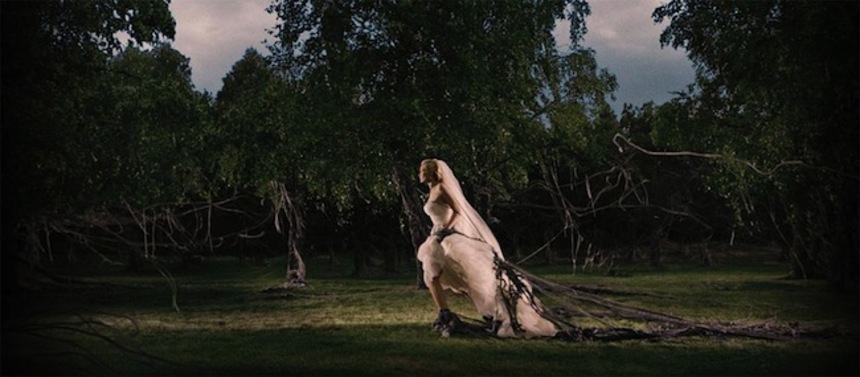
Before the lights totally dim our intrepid writers (and they most certainly are intrepid, for festival going is very much akin to a jungle adventure of olde), Peter Gutierrez and Aaron Krasnov have a few more words on the eclectic line-up at this year's fest. So "few" that we're doing a two-parter! In this part you'll find their takes on Bela Tarr's The Turin Horse, Lars Von Trier's Melancholia, and Julia Loktev's The Loneliest Planet. Please consider there are minor spoilers ahead for some of these titles. Now, to start things off, a further word on the Mexican Actioneer Miss Bala. Gentlemen, take it away...
Aaron Krasnov: Peter, [in your review] you go a long way toward praising [Miss Bala's] craft, which is quite deserving, something that was very much labored over by the director, so much so, that he shot an entire dry-run on video, in preparation for shooting the film. It's at once the film's largest strength and most strident detractor in my mind.
 Miss Bala is the only film I can recall that is a
gritty, gang-land thriller told in the passive voice. From the constant,
centering tracking shots that begin with the back of Bala's head that
give the feeling of audience as intimate stranger, with no room to call
out and help, to the rehearsed gunfights, it all feels strangely
preordained. Presenting a world glossy in its violence and pageantry I
felt a bit distanced, emotionally. Dread, the prevailing force is always
apparent, but lack of context at times precludes the rest. So little is
given with regards to the actions taking place that my mind would run
off looking for answers; why, for whom, how, and so on.
Miss Bala is the only film I can recall that is a
gritty, gang-land thriller told in the passive voice. From the constant,
centering tracking shots that begin with the back of Bala's head that
give the feeling of audience as intimate stranger, with no room to call
out and help, to the rehearsed gunfights, it all feels strangely
preordained. Presenting a world glossy in its violence and pageantry I
felt a bit distanced, emotionally. Dread, the prevailing force is always
apparent, but lack of context at times precludes the rest. So little is
given with regards to the actions taking place that my mind would run
off looking for answers; why, for whom, how, and so on.Peter Gutierrez: Nearly everything you say about Miss Bala I agree with -- and especially
like how you situate the audience as a friend of the protagonist, but
one who's unable to help or call out. For me, that, and the feeling of
increasing dread, were enough. Not nice emotions, or comfortable ones,
but it certainly didn't leave things feeling emotionally empty for me. And
having questions in my mind that often weren't answered, well, that also
worked for me -- that's because I never felt that this was due to lack
of coherency at source but rather because of all the intentional
interruptions: you're not really allowed
to develop a train of thought. So I think for the film to work
you need to surrender and put your faith in the confused and abused
twenty-three-year-old at its center -- the result, in the end, is a
kind of role reversal because you're the one who needs help, and she becomes
the agency for it since she's able to develop a bit of poise and some
ability to think on her feet in the course of the story. It's a brutal
coming-of-age flick in that she doesn't age in human years but in some
form of narco-years, which seems to translate to maybe five years for
every one of our days.
Still, I'm inferring from what you say that the technical prowess actually undermines the emotional connections that we could make, and I think that's really something to chew on. In a big sense. In other words, the issue goes beyond [director Gerardo] Naranjo and what he's trying do here. For some reason I'm recalling Kidnapped (Secuestrados), and as much as I admire that film -- my admiration being comparable to that of Bala -- the same incredible combination of camerawork and choreography can have a distancing effect on viewers although its hyper-subjectivity is obviously intended to have the exact opposite effect. That is, the more the cineaste-inside-us appreciates all the technique, the more we become aware that it is technique and, paradoxically, pops us out of the film's reality, even if just its emotional reality. Is this what you mean by the "rehearsed" feeling? Anyhow, that's how I took it. Oddly, then, the most old-fashioned movies, the Golden Age ones that perfected simple things like shot-counter-shot, are probably the most involving since they so prized the invisibility of craft.
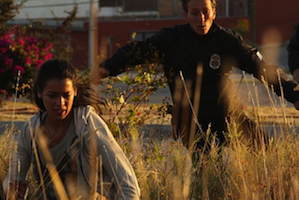 AK: Continuing the audience as mute participant, I understand the lack
of context to increase confusion and keep the viewer in Bala's mind-set,
but, at least for me, the story was too topical for my mind to slip
into that space. I brought my own understanding of situation, place, and
circumstance across the border and continued trying to find where Bala
fit in to that previous knowledge set. This is exacerbated when the
film's message appears, as it was not spoken to during the film though
ties directly back to our toted preconceptions.
AK: Continuing the audience as mute participant, I understand the lack
of context to increase confusion and keep the viewer in Bala's mind-set,
but, at least for me, the story was too topical for my mind to slip
into that space. I brought my own understanding of situation, place, and
circumstance across the border and continued trying to find where Bala
fit in to that previous knowledge set. This is exacerbated when the
film's message appears, as it was not spoken to during the film though
ties directly back to our toted preconceptions.
This may be something of a strange Uncanny Valley, in which when the events are filmed in a seamless, immediate manner it suddenly feels contrived. The editing aided shots of Gaspar Noé's Irreversible and Enter the Void, or the beginning of Fincher's Fight Club (waste basket) and Panic Room (house entry). Here the camera, manipulated through unnatural means breaks the plane of physical choreography, cementing my suspension of disbelief, and erecting the barrier of spectacle.
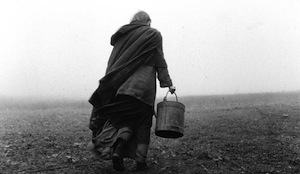 PG: Well, in terms of NYFF what immediately comes to mind is Bela Tarr and Agnes Hranitzky's The Turin Horse.
As in any Tarr film there's a mix of long-take strategies, both
tracking shots and static shots. The most mesmerizing example of the
former occurs in the first few minutes, the camera shifting its focus so
that we actually get, in effect, several different shots -- we move
from horse, to human, to both, to the stormy landscape through which
they travel. It's enthralling cinema, aided significantly by what might
oddly be called an
uptempo dirge from Mihaly Vig that sounds like a collaboration between
Tom Waits and Philip Glass.
PG: Well, in terms of NYFF what immediately comes to mind is Bela Tarr and Agnes Hranitzky's The Turin Horse.
As in any Tarr film there's a mix of long-take strategies, both
tracking shots and static shots. The most mesmerizing example of the
former occurs in the first few minutes, the camera shifting its focus so
that we actually get, in effect, several different shots -- we move
from horse, to human, to both, to the stormy landscape through which
they travel. It's enthralling cinema, aided significantly by what might
oddly be called an
uptempo dirge from Mihaly Vig that sounds like a collaboration between
Tom Waits and Philip Glass.
Then the film settles in for mostly indoors action, if I may be permitted the use of the word "action" in this regard, for the next two-and-a-half hours. I love Tarr, and I think other fans will not be disappointed -- although newcomers will be left scratching their heads a bit. I mean, I scratched my head, too, but I knew to expect that going in. I did feel, however, that Tarr and co-writer Laszlo Krasnahorkai come close to pulling our leg at a few points with all the repetition, but I must say I enjoyed all the false endings. Don't know if they were designed as such, but there were three or four moments where we faded to black and I expected the houselights to come on... and then things just kept going. And while what follows may be a mild *spoiler*, I was pleasantly (perversely?) surprised to discover by the time The Turin Horse actually ended, it had become an end-of-the-world picture. In fact, at one point in NYFF I'd only seen four new movies (i.e., I'm not counting those in the Nikkatsu retro) and three of them were apocalyptically themed. The other two were Melancholia and 4:44 Last Day on Earth.
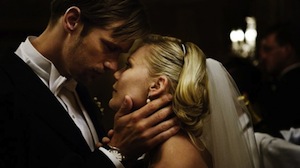 AK: I've only had the chance to see Melancholia, Lars Von Trier's grand
depiction of the wistful condition, codified in celestial doomsday. Von
Trier continues to impress visually, with the help of
cinematographer Manuel Alberto Claro and a prototype ARRI Alexa, evoking Last Year at Marienbad's metaphoric garden of
impossible shadows.
AK: I've only had the chance to see Melancholia, Lars Von Trier's grand
depiction of the wistful condition, codified in celestial doomsday. Von
Trier continues to impress visually, with the help of
cinematographer Manuel Alberto Claro and a prototype ARRI Alexa, evoking Last Year at Marienbad's metaphoric garden of
impossible shadows.
AK: For me it's hard to criticize the structure of The Loneliest Planet, though I agree the latter section feels more drawn out. By placing the incident at the mid-point of the film, two diametrically opposed halves are created; joy, playfulness, intimacy vs. isolation, introspection, regret. Naturally the second stage of emotions is less easy to sit through, and when compared against the first half's breeziness feels longer. To me, the separation needed to set in, letting each character show the weight of the action and intimate the outlook of their relationship.
---------
And that's it for part 1! Tune in Wednesday for part 2 where Peter and Aaron will discuss, amongst other films, Steve McQueen's Shame, Iranian drama A Seperation, the aptly titled Roger Corman doc Corman's World, and early Oscar contender The Artist.
Still, I'm inferring from what you say that the technical prowess actually undermines the emotional connections that we could make, and I think that's really something to chew on. In a big sense. In other words, the issue goes beyond [director Gerardo] Naranjo and what he's trying do here. For some reason I'm recalling Kidnapped (Secuestrados), and as much as I admire that film -- my admiration being comparable to that of Bala -- the same incredible combination of camerawork and choreography can have a distancing effect on viewers although its hyper-subjectivity is obviously intended to have the exact opposite effect. That is, the more the cineaste-inside-us appreciates all the technique, the more we become aware that it is technique and, paradoxically, pops us out of the film's reality, even if just its emotional reality. Is this what you mean by the "rehearsed" feeling? Anyhow, that's how I took it. Oddly, then, the most old-fashioned movies, the Golden Age ones that perfected simple things like shot-counter-shot, are probably the most involving since they so prized the invisibility of craft.
 AK: Continuing the audience as mute participant, I understand the lack
of context to increase confusion and keep the viewer in Bala's mind-set,
but, at least for me, the story was too topical for my mind to slip
into that space. I brought my own understanding of situation, place, and
circumstance across the border and continued trying to find where Bala
fit in to that previous knowledge set. This is exacerbated when the
film's message appears, as it was not spoken to during the film though
ties directly back to our toted preconceptions.
AK: Continuing the audience as mute participant, I understand the lack
of context to increase confusion and keep the viewer in Bala's mind-set,
but, at least for me, the story was too topical for my mind to slip
into that space. I brought my own understanding of situation, place, and
circumstance across the border and continued trying to find where Bala
fit in to that previous knowledge set. This is exacerbated when the
film's message appears, as it was not spoken to during the film though
ties directly back to our toted preconceptions.
As for the long, balletic take that emerges as singular artistic
moment outside of the grander work, to me the impossible tracking shot
is often more immersive than the one in which you feel the immensity of
importance placed on the hopefully flawless take. Adding to Kidnapped
and Miss Bala which both feature this type of shot, I'll bring up the
beach scene in Atonement: a masterful, labored event, where each new
set-piece, cast-off and interaction expands the wonder of
accomplishment. No longer does your brain focus completely on what is
happening in the story, but pulls back a layer to the magnitude of what
is happening behind the camera.
This may be something of a strange Uncanny Valley, in which when the events are filmed in a seamless, immediate manner it suddenly feels contrived. The editing aided shots of Gaspar Noé's Irreversible and Enter the Void, or the beginning of Fincher's Fight Club (waste basket) and Panic Room (house entry). Here the camera, manipulated through unnatural means breaks the plane of physical choreography, cementing my suspension of disbelief, and erecting the barrier of spectacle.
As a hybrid: the stadium scene in The
Secret in Their Eyes, with enough apparent craft to draw attention, but a
knowledge of not-one-event behind the scenes to settle my nerves.
 PG: Well, in terms of NYFF what immediately comes to mind is Bela Tarr and Agnes Hranitzky's The Turin Horse.
As in any Tarr film there's a mix of long-take strategies, both
tracking shots and static shots. The most mesmerizing example of the
former occurs in the first few minutes, the camera shifting its focus so
that we actually get, in effect, several different shots -- we move
from horse, to human, to both, to the stormy landscape through which
they travel. It's enthralling cinema, aided significantly by what might
oddly be called an
uptempo dirge from Mihaly Vig that sounds like a collaboration between
Tom Waits and Philip Glass.
PG: Well, in terms of NYFF what immediately comes to mind is Bela Tarr and Agnes Hranitzky's The Turin Horse.
As in any Tarr film there's a mix of long-take strategies, both
tracking shots and static shots. The most mesmerizing example of the
former occurs in the first few minutes, the camera shifting its focus so
that we actually get, in effect, several different shots -- we move
from horse, to human, to both, to the stormy landscape through which
they travel. It's enthralling cinema, aided significantly by what might
oddly be called an
uptempo dirge from Mihaly Vig that sounds like a collaboration between
Tom Waits and Philip Glass. Then the film settles in for mostly indoors action, if I may be permitted the use of the word "action" in this regard, for the next two-and-a-half hours. I love Tarr, and I think other fans will not be disappointed -- although newcomers will be left scratching their heads a bit. I mean, I scratched my head, too, but I knew to expect that going in. I did feel, however, that Tarr and co-writer Laszlo Krasnahorkai come close to pulling our leg at a few points with all the repetition, but I must say I enjoyed all the false endings. Don't know if they were designed as such, but there were three or four moments where we faded to black and I expected the houselights to come on... and then things just kept going. And while what follows may be a mild *spoiler*, I was pleasantly (perversely?) surprised to discover by the time The Turin Horse actually ended, it had become an end-of-the-world picture. In fact, at one point in NYFF I'd only seen four new movies (i.e., I'm not counting those in the Nikkatsu retro) and three of them were apocalyptically themed. The other two were Melancholia and 4:44 Last Day on Earth.
 AK: I've only had the chance to see Melancholia, Lars Von Trier's grand
depiction of the wistful condition, codified in celestial doomsday. Von
Trier continues to impress visually, with the help of
cinematographer Manuel Alberto Claro and a prototype ARRI Alexa, evoking Last Year at Marienbad's metaphoric garden of
impossible shadows.
AK: I've only had the chance to see Melancholia, Lars Von Trier's grand
depiction of the wistful condition, codified in celestial doomsday. Von
Trier continues to impress visually, with the help of
cinematographer Manuel Alberto Claro and a prototype ARRI Alexa, evoking Last Year at Marienbad's metaphoric garden of
impossible shadows.
Capturing the crushing
force with which life
sometimes bears down, parasitically touching those within reach. Kirsten
Dunst carries
with her the numbing tendrils of despair, eyelids of impossible heft and
a languishing, burdened outlook. Intoning the somnambulant affliction,
Dunst beautifully wilts with each lugubrious exertion. Melancholia is, in many ways the perfect foil to Antichrist's
angry, unstable disease, showing the quieter, often more painful side of
depression. Offering no hope, no sentiment and no escape; Melancholy is
all consuming.
PG: I remember talking with you after Melancholia -- and I think I need to go back and revisit Antichrist. I liked it, but Melancholia struck me as both more ambitious and more satisfying. I think one of the big reasons for the latter are the performances. I knew Dunst would be good, but I was still unprepared for what she accomplishes here -- I came away thinking she's one of the great screen actors working today, period. Kiefer Sutherland and others turn in very solid work as well; and in more minor roles John Hurt and Charlotte Rampling, although in behaving rascally and bitterly respectively are somewhat typecast, are a heck of a lot of fun to watch. And I know you like Udo Kier's comic turn as well. Overall, then, I simply found Melancholia to be very generous, and in ways I didn't expect. I guess that with Von Trier's work in recent years, with all its thematic and visual audacity, it's easy to lose sight of what a fine director of actors he is. (By the way, you didn't miss out on anything with 4:44 Last Day on Earth -- really the only film I've seen at the fest this year that I felt, and I know this is harsh, was a true waste of my time. Formally, dramatically, even scientifically, it represents a kind of all-around embarrassment.)
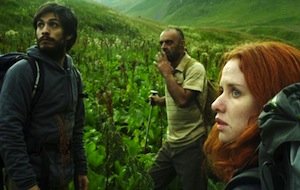 Staying with that idea, I should say that the
acting, and the expert direction of the actors, was also a big reason I
enjoyed Julia Loktev's The Loneliest Planet so much. Playful, intimate, dimensional, and most of all, real --
that's how leads Hani Furstenberg and Gael Garcia Bernal come across.
The juxtaposition of their small moments with the
vastness of the setting is perhaps an obvious strategy, but I didn't
care: it worked wonderfully for me, drawing me in close and then
"pulling back" with those awe-inspiring landscape shots. My only problem
is with the structure, or maybe the scale, of the narrative as a whole.
I haven't read the short story upon which the film is based but even
when watching it I was reminded of a short form work... in the best
sense, though. Like a story by Alice Munro, you get a masterful
depiction of everyday people who gradually, inexorably, find themselves
in a world of dread, slowly surrounded by intense feelings that can't be
communicated (possibly because of their very intensity). I can't say I
disliked any of the touches of characterization after the film's major
turning point, but unfortunately, in aggregate they, and events
generally, began to feel drawn-out to me. The result was a watering-down
of the film's power even as I still admired Loktev's work on so
many levels.
Staying with that idea, I should say that the
acting, and the expert direction of the actors, was also a big reason I
enjoyed Julia Loktev's The Loneliest Planet so much. Playful, intimate, dimensional, and most of all, real --
that's how leads Hani Furstenberg and Gael Garcia Bernal come across.
The juxtaposition of their small moments with the
vastness of the setting is perhaps an obvious strategy, but I didn't
care: it worked wonderfully for me, drawing me in close and then
"pulling back" with those awe-inspiring landscape shots. My only problem
is with the structure, or maybe the scale, of the narrative as a whole.
I haven't read the short story upon which the film is based but even
when watching it I was reminded of a short form work... in the best
sense, though. Like a story by Alice Munro, you get a masterful
depiction of everyday people who gradually, inexorably, find themselves
in a world of dread, slowly surrounded by intense feelings that can't be
communicated (possibly because of their very intensity). I can't say I
disliked any of the touches of characterization after the film's major
turning point, but unfortunately, in aggregate they, and events
generally, began to feel drawn-out to me. The result was a watering-down
of the film's power even as I still admired Loktev's work on so
many levels.
PG: I remember talking with you after Melancholia -- and I think I need to go back and revisit Antichrist. I liked it, but Melancholia struck me as both more ambitious and more satisfying. I think one of the big reasons for the latter are the performances. I knew Dunst would be good, but I was still unprepared for what she accomplishes here -- I came away thinking she's one of the great screen actors working today, period. Kiefer Sutherland and others turn in very solid work as well; and in more minor roles John Hurt and Charlotte Rampling, although in behaving rascally and bitterly respectively are somewhat typecast, are a heck of a lot of fun to watch. And I know you like Udo Kier's comic turn as well. Overall, then, I simply found Melancholia to be very generous, and in ways I didn't expect. I guess that with Von Trier's work in recent years, with all its thematic and visual audacity, it's easy to lose sight of what a fine director of actors he is. (By the way, you didn't miss out on anything with 4:44 Last Day on Earth -- really the only film I've seen at the fest this year that I felt, and I know this is harsh, was a true waste of my time. Formally, dramatically, even scientifically, it represents a kind of all-around embarrassment.)
 Staying with that idea, I should say that the
acting, and the expert direction of the actors, was also a big reason I
enjoyed Julia Loktev's The Loneliest Planet so much. Playful, intimate, dimensional, and most of all, real --
that's how leads Hani Furstenberg and Gael Garcia Bernal come across.
The juxtaposition of their small moments with the
vastness of the setting is perhaps an obvious strategy, but I didn't
care: it worked wonderfully for me, drawing me in close and then
"pulling back" with those awe-inspiring landscape shots. My only problem
is with the structure, or maybe the scale, of the narrative as a whole.
I haven't read the short story upon which the film is based but even
when watching it I was reminded of a short form work... in the best
sense, though. Like a story by Alice Munro, you get a masterful
depiction of everyday people who gradually, inexorably, find themselves
in a world of dread, slowly surrounded by intense feelings that can't be
communicated (possibly because of their very intensity). I can't say I
disliked any of the touches of characterization after the film's major
turning point, but unfortunately, in aggregate they, and events
generally, began to feel drawn-out to me. The result was a watering-down
of the film's power even as I still admired Loktev's work on so
many levels.
Staying with that idea, I should say that the
acting, and the expert direction of the actors, was also a big reason I
enjoyed Julia Loktev's The Loneliest Planet so much. Playful, intimate, dimensional, and most of all, real --
that's how leads Hani Furstenberg and Gael Garcia Bernal come across.
The juxtaposition of their small moments with the
vastness of the setting is perhaps an obvious strategy, but I didn't
care: it worked wonderfully for me, drawing me in close and then
"pulling back" with those awe-inspiring landscape shots. My only problem
is with the structure, or maybe the scale, of the narrative as a whole.
I haven't read the short story upon which the film is based but even
when watching it I was reminded of a short form work... in the best
sense, though. Like a story by Alice Munro, you get a masterful
depiction of everyday people who gradually, inexorably, find themselves
in a world of dread, slowly surrounded by intense feelings that can't be
communicated (possibly because of their very intensity). I can't say I
disliked any of the touches of characterization after the film's major
turning point, but unfortunately, in aggregate they, and events
generally, began to feel drawn-out to me. The result was a watering-down
of the film's power even as I still admired Loktev's work on so
many levels.AK: For me it's hard to criticize the structure of The Loneliest Planet, though I agree the latter section feels more drawn out. By placing the incident at the mid-point of the film, two diametrically opposed halves are created; joy, playfulness, intimacy vs. isolation, introspection, regret. Naturally the second stage of emotions is less easy to sit through, and when compared against the first half's breeziness feels longer. To me, the separation needed to set in, letting each character show the weight of the action and intimate the outlook of their relationship.
---------
And that's it for part 1! Tune in Wednesday for part 2 where Peter and Aaron will discuss, amongst other films, Steve McQueen's Shame, Iranian drama A Seperation, the aptly titled Roger Corman doc Corman's World, and early Oscar contender The Artist.

Do you feel this content is inappropriate or infringes upon your rights? Click here to report it, or see our DMCA policy.






